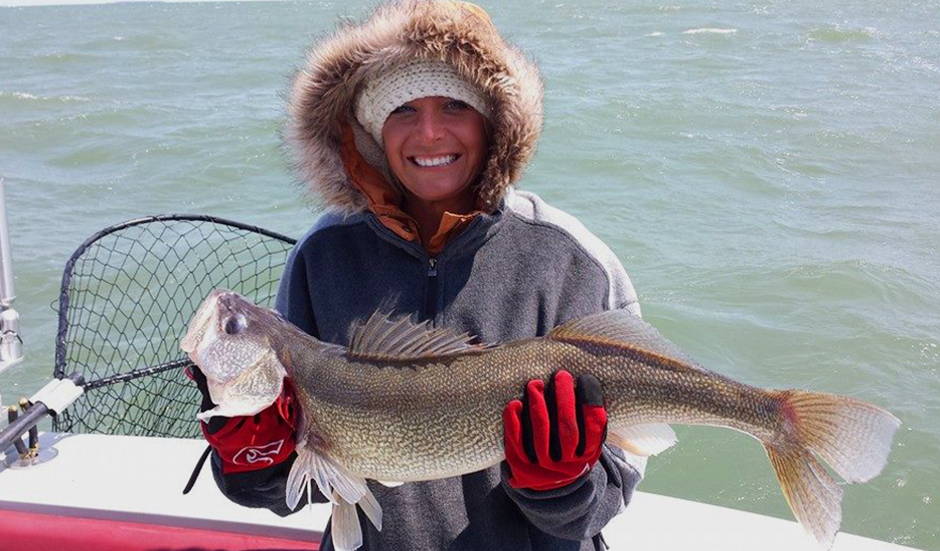Species: WALLEYE
Description
Walleyes are mostly olive and gold, with a white belly. The dorsal side is olive, fading into a golden color on the the flanks. There are five darker saddles extending to the uppers sides. The walleye’s mouth is large and full of many sharp teeth!
Sporting Qualities
The walleye species is a good game fish; they like to stay deep and will wage a determined battle. Walleye are the gentlest biters of all game fish. One of the best techniques during the summer months is slow trolling at depths below 10 feet. They are also light sensitive, therefore they bite best around dawn or dusk, or on cloudy days. The most effective baits and lures include minnows, leeches, nightcrawlers, jigs, minnow plugs and spinners.
Habitat
Walleye live mostly in large bodies of fresh water and are seldom found in lakes or streams. They prefer cool water and can even live under the ice during the winter months. Because of their light sensitive eyes and preference for cooler waters, they are usually found at depths of at least 10 feet.
Feeding Habit
Walleye feed mostly in dimly lit waters, especially when the light is fading rapidly. They feed on aquatic insects, crayfish, larval salamanders, leeches and snails.
Species: STEELHEAD
Description
This species has a bluish-gray back and upper sides and bright, silvery lower sides, with a distinct separation between the two colors. The upper halves of their bodies are heavily speckled with small black spots. Their tail fin is completely covered with spots and may be squared or slightly forked. The inside of the Steelhead’s mouth is white. The body is elongated and they are fast, strong swimmers.
Sporting Qualities
Steelhead are one of the most prized sport fish species of inland fishermen because of their delicious meat, large size, and strong fighting instincts. They have been seen leaping five feet out of the water when hooked. Most steelhead are caught in the river systems when they return from lakes or oceans to spawn. The most effective bait is salmon or steelhead eggs, shrimp, nightcrawlers, but also take spinners and jigs, bobbers and flies.
Habitat
Steelhead live in both fresh and salt water. In fresh water, they prefer cooler temperatures. They prefer faster running streams when they return to spawn.
Feeding Habits
Steelhead feed on fish, insects, squid, euphausiid and amphipods.
Species: YELLOW PERCH
Description
Yellow perch have dark vertical stripes and a gold or yellow body. Adult sizes typically range from 4–11 inches, but have been known to grow larger. The yellow perch’s body is an oblong oval and is flattened side-to-side. The anal fins are green or yellow-orange, the dorsal fin is olive, and the belly is cream colored. The vertical bands on the body fade as they near the belly.
Sporting Qualities
June through November is best time for fishing for perch, although they bite reasonably well all year and are often caught through the ice. They prefer heavy deep eddies, beds of weeds and streams near trees or bushes growing in or overhanging the water.
Habitat
Yellow perch are found mainly in lakes and sometimes in larger rivers. They require clear water, but do have a high tolerance for low oxygen conditions. They prefer moderate temperatures, avoiding both the cold deep and warm surface waters. Young perch generally inhabit shallower water than larger ones, but as the temperature increases, they all move to cooler, deeper water.
Feeding Habits
Perch feed most heavily during daylight hours on immature aquatic insects, crayfish, snails, smaller fish species, and fish eggs.
Species: SMALLMOUTH BASS
Description
This species has a thick, long body, red eyes, and a broad, slightly forked tail. Its pelvic fins are near the front of the body, below the pectoral fins. There is a single spine on each pelvic fin and on the front of the anal fin. The two dorsal fins are connected; the front one is spiny and the other features one spine and several soft rays. Smallmouth will vary from brown and golden brown to olive green on the back, which fades to gold on the sides and white on the belly.
Young Smallmouth have more distinct vertical striping or rows of spots on their sides and the tail fin is often orange at the base with black and white outer edges. The smallmouth has a large jaw bone that extends to about the middle of the eye.
Sporting Qualities
Smallmouth Bass are strong tough fighters known for their ability to jump repeatedly during the fight in attempts to shake free from the hook. Nightcrawlers and live crayfish, as well as crayfish-colored crankbaits and jigs, are used the most often for catching Smallmouth.
Habitat
Smallmouth Bass prefer clear, calm waters and are often found in areas with gravel or rocky bottoms. They live in midsize, gentle streams that offer deep pools and shade or in clear lakes and reservoirs near rocky bluffs or steep banks.
Feeding Habits
Smallmouth feed on crayfish, insects and smaller fish species.
Species: SALMON
Description
Coho Salmon are a dark metallic blue to black on top with bright silver sides. They have black spots across the top of their body and on the top of their tail fin. The gums of the lower jaw are gray or white. They are excellent swimmers and have long and thick muscular bodies.
Sporting Qualities
Coho Salmon are spectacular fighters and are considered the most acrobatic of the salmon, often leaping when hooked.
Habitat
Coho Salmon spend part of their life in the ocean and part in small freshwater streams. They prefer streams with a weaker current than other salmon. Some spend their entire life in lakes, particularly those transplanted in the Great Lakes region.
Feeding Habits
Young Coho Salmon feed on aquatic insects and small fish. In the Great Lakes, adults eat alewives, lake chubs, rainbow smelt, and herring.


